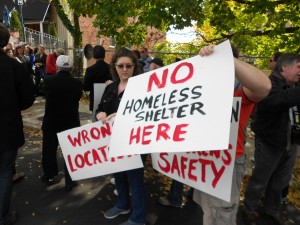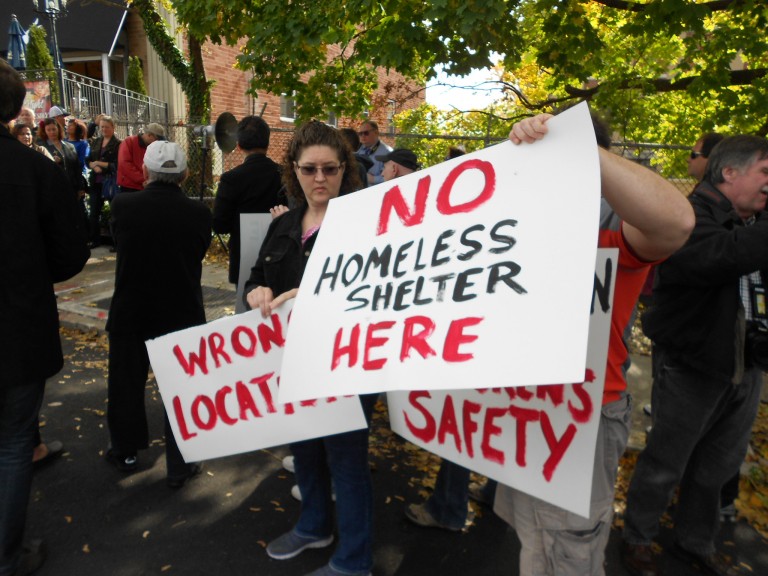
Residents, civic leaders and elected officials have for months been protesting a proposal for a 125-family homeless shelter in Glendale. File photo
After the city Department of Homeless Services informed elected officials that the agency is proceeding with an environmental impact study of a site proposed to hold a homeless shelter that has been widely condemned by area leaders, a bevy of elected officials this week urged the DHS and the nonprofit that could operate the shelter to present their plans for the facility to Community Board 5.
Assemblyman Andrew Hevesi (D-Forest Hills), state Sen. Joe Addabbo, Jr. (D-Howard Beach), Councilwoman Elizabeth Crowley (D-Middle Village), Assemblyman Mike Miller (D-Woodhaven), U.S. Rep. Grace Meng (D-Queens), and Queens Borough President Melinda Katz said in an April 1 letter sent to Community Board 5, DHS Commissioner Gilbert Taylor, Mayor Bill de Blasio, city Comptroller Scott Stringer, and others, that the DHS and Samaritan Village need to publicly present information about the homeless shelter, which could hold up to 125 families at a former airplane factory located at 78-16 Cooper Ave.
The letter followed a March 17 meeting elected officials had with DHS Commissioner Gilbert Taylor and Assistant Commissioner Lisa Black, at which time they were informed that while contract budget negotiations were ongoing, DHS had chosen to proceed with an environmental impact study, or EIS, of the site – an assessment of the property that legally must happen before a shelter would be able to open.
“While this movement is not indicative of the feasibility of this proposal, we believe that it is both appropriate and necessary to engage the community on this topic to obtain their input,” the elected officials, all of whom oppose the shelter proposal, wrote in reference to the EIS. “We are urging [the DHS] and Samaritan Village to present their plan before Community Board 5, and consider any feedback provided by board members or the public as you deem appropriate.”
The elected officials, who voiced their opposition to the shelter during the March 17 meeting with the city, stressed that DHS and Samaritan Village “have a responsibility to remain accountable to the communities in which they propose to operate facilities.”
“Bringing these organizations before Community Board 5 will provide an opportunity for board members and residents to ask questions regarding the review process, proposed facility, and to provide feedback to DHS and Samaritan Village,” they continued in the letter.
Along with the lawmakers, civic leaders and business owners have issued harsh criticism about the shelter, saying the influx of people to the area would overburden already crowded classrooms and could drive away customers from shops that have recently opened. Additionally, residents have questioned whether the site’s former status as an airplane parts factory could present health problems for individuals at the shelter and have said there is not enough public transportation close to the shelter to adequately provide for the individuals who would be staying at the site.
Samaritan Village submitted its plan in response to DHS’ request for proposals in August 2013 to operate the 125-unit transitional housing facility, and in early December the DHS sent a letter to former Mayor Michael Bloomberg’s office, stating the agency was considering awarding a five-year $27 million contract to the nonprofit.
Ultimately, the city Comptroller would give the final signature on a contract permitting the shelter to open. The mayor’s go-ahead is not legally required before a shelter began operating.

